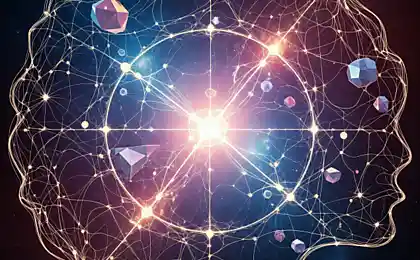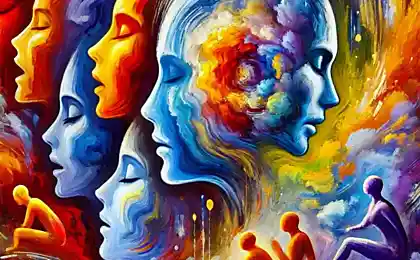192
The Happiness Code: The Secret Algorithms of Human Joy

Happiness is a universal goal that everyone strives for. But what exactly makes us happy and how can we enhance this state? In this article, we explore the neurobiological foundations of happiness, offer practical techniques for generating positive emotions, share inspiring stories of people who have found their unique recipe for joy, talk about how to reprogram the brain for optimism, and discover unexpected sources of pleasure and inspiration.

Neurobiology of Happiness
Happiness is not just an emotional state, but a complex biochemical process that involves various neurotransmitters and hormones.
- Serotonin: This neurotransmitter plays a key role in regulating mood, sleep and appetite. High serotonin levels are associated with feelings of well-being and satisfaction.
- Dopamine: Responsible for feeling pleasure and motivation. Dopamine is produced by achieving goals and receiving rewards, which contributes to the desire for new achievements.
- Oxytocin: Known as the "love hormone." It strengthens social ties and trust between people, which contributes to the formation of strong interpersonal relationships.
- Endorphins: Natural painkillers that cause feelings of euphoria and reduce stress levels.
“Understanding the neurobiology of happiness helps us to be more mindful about creating conditions for emotional well-being,” says Anna Smirnova, professor of neuropsychology.
Practical techniques for generating positive emotions
There are many methods that help to increase feelings of happiness and satisfaction:
- Practicing gratitude: Keeping a gratitude journal daily helps you focus on the positive aspects of life.
- Meditation and Mindfulness: These practices help reduce stress and increase awareness by promoting inner peace.
- Physical activity: Regular exercise stimulates the production of endorphins, improving mood and overall well-being.
- Social networks: Time spent with loved ones increases a sense of belonging and support.
- Creativity: Art, music, or other creative hobbies help express emotions and stimulate brain activity.
Interesting fact:
Studies show that people who practice gratitude have stronger immune systems and are less sick.
People who have found their own unique recipe for happiness
Everyone is unique, and their path to happiness is also unique. Here are some inspiring examples:
Ekaterina, 29 years old: “I have always felt unhappy despite my career successes. One day I decided to change my lifestyle and started volunteering. By helping others, I felt real satisfaction and found my calling. ?
Alexander, 45 years old: “After the divorce, I immersed myself in work, but it only made my condition worse. I decided to do sports and yoga, which helped me find inner balance and improve my quality of life. ?
“Stories of such people show that happiness can be found in the most unexpected places, the main thing is to be open to change,” – psychologist and coach Marina Lebedeva.
A Scientific View of Intuition and the Subconscious
Intuition and the subconscious play an important role in our perception of happiness and making decisions that affect our emotional state.
- Intuitive solutions: Our subconscious mind processes vast amounts of information, helping us make quick decisions without conscious analysis.
- Subconscious influence: Memories and past experiences shape our current emotions and reactions, sometimes without our awareness.
- Neuroplasticity: The brain is able to change its structures and functions under the influence of new experiences and training, which allows it to be reprogrammed for optimism.
- Dreams and the subconscious: Dreams can serve as a channel for subconscious signals that help to understand their desires and fears.
Interesting fact:
According to research, about 70% of our decisions are made at the subconscious level, without conscious intervention.
Exercises to adjust the internal tuning fork
In order to better hear your inner voice and direct your life in the right direction, you can use the following exercises:
- Mindfulness meditation: Daily meditation practice helps calm the mind and increase awareness.
- Keeping a diary: Write down your thoughts and feelings every day to better understand your inner desires.
- Practicing gratitude: Note the things you are grateful for every day, which helps you focus on the positive aspects of life.
- Visualization of objectives: Present your goals and dreams in detail to enhance their relevance to yourself.
- Yoga and breathing exercises: They help relieve stress and improve concentration, which contributes to a better perception of internal signals.
“Setting up an internal tuning fork is a process that takes time and practice, but the results are worth the effort,” meditation instructor Olga Smirnova said.
How to distinguish the real desire from the imposed
Sometimes it is difficult to know what you really want and what is imposed by external circumstances or expectations of society. Here are a few ways to distinguish the real desire from the imposed:
- Introspection: Ask yourself the reasons and motives for your desires. Why do you want this? What's behind this?
- Listen to your emotions: Real desires cause positive emotions and feelings of satisfaction, while imposed desires are often accompanied by anxiety or doubt.
- Time for reflection: Give yourself time to think and evaluate your desires. Real aspirations usually stay with you for a long time.
- Comparison with others: Do not compare your desires with those of others. Your goals should be personal and unique.
- Prioritization: Define your life priorities clearly and match them with your desires.
Expert advice:
Conduct regular introspection and reflection to better understand your true desires and avoid being influenced by external factors.
Conclusion
The inner compass is a powerful tool that helps us navigate our lives and make decisions that align with our true desires and values. By developing emotional intelligence, practicing self-determination and following our inner cues, we can achieve harmony and happiness. Remember that your true voice is always within you, and it’s important to listen and respect.
“True self-understanding is the key to achieving complete harmony and happiness.” – Alexey Lebedev, philosopher and psychologist
Start your journey to self-discovery today and you will be amazed at how much your life and the world around you can change.
The Inner Compass: How to Hear Your True Voice
Power Points Inside Us: The Hidden Reserves of Human Potential























